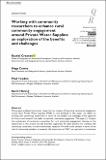Files in this item
Working with community researchers to enhance rural community engagement around Private Water Supplies : an exploration of the benefits and challenges
Item metadata
| dc.contributor.author | Creaney, Rachel | |
| dc.contributor.author | Currie, Mags | |
| dc.contributor.author | Teedon, Paul | |
| dc.contributor.author | Helwig, Karin | |
| dc.date.accessioned | 2021-01-11T13:30:02Z | |
| dc.date.available | 2021-01-11T13:30:02Z | |
| dc.date.issued | 2020-12-24 | |
| dc.identifier | 271487240 | |
| dc.identifier | b145ee66-7453-44b2-bcd2-72e3f079e21d | |
| dc.identifier | 000608770600001 | |
| dc.identifier | 85098054339 | |
| dc.identifier.citation | Creaney , R , Currie , M , Teedon , P & Helwig , K 2020 , ' Working with community researchers to enhance rural community engagement around Private Water Supplies : an exploration of the benefits and challenges ' , Qualitative Research , vol. Online First . https://doi.org/10.1177/1468794120978883 | en |
| dc.identifier.issn | 1468-7941 | |
| dc.identifier.uri | https://hdl.handle.net/10023/21259 | |
| dc.description | Funding: CREW: Scotland's centre of expertise for waters; the Scottish Government's Strategic Research Programme (2016-2021). | en |
| dc.description.abstract | This project employed community researchers as a means of improving community engagement around their Private Water Supplies (PWS) in rural Scotland. In this paper, we reflect on working with community researchers in terms of the benefits and challenges of the approach for future rural research that seeks to improve community engagement. The paper (1) critiques the involvement of community researchers for rural community engagement, drawing on the experiences in this project and (2) provides suggestions for good practice for working with community researchers in rural communities’ research. We offer some context in terms of the role of community members in research, the importance of PWS, our approach to community researchers, followed by the methodological approach and findings and our conclusions to highlight that community researchers can be beneficial for enhancing community engagement, employability, and social capital. Future community researcher approaches need to be fully funded to ensure core researchers can fulfil their duty of care, which should not stop when data collection is finished. Community researchers need to be supported in two main ways: as continuing faces of the project after the official project end date and to transfer their newly acquired skills to future employment opportunities | |
| dc.format.extent | 18 | |
| dc.format.extent | 146049 | |
| dc.language.iso | eng | |
| dc.relation.ispartof | Qualitative Research | en |
| dc.subject | Community researchers | en |
| dc.subject | Lay researchers | en |
| dc.subject | Private Water Supplies | en |
| dc.subject | Participatory research | en |
| dc.subject | Community engagement | en |
| dc.subject | GF Human ecology. Anthropogeography | en |
| dc.subject | HT Communities. Classes. Races | en |
| dc.subject | 3rd-DAS | en |
| dc.subject.lcc | GF | en |
| dc.subject.lcc | HT | en |
| dc.title | Working with community researchers to enhance rural community engagement around Private Water Supplies : an exploration of the benefits and challenges | en |
| dc.type | Journal article | en |
| dc.contributor.institution | University of St Andrews. Geographies of Sustainability, Society, Inequalities and Possibilities | en |
| dc.contributor.institution | University of St Andrews. School of Geography & Sustainable Development | en |
| dc.identifier.doi | https://doi.org/10.1177/1468794120978883 | |
| dc.description.status | Peer reviewed | en |
This item appears in the following Collection(s)
Items in the St Andrews Research Repository are protected by copyright, with all rights reserved, unless otherwise indicated.

